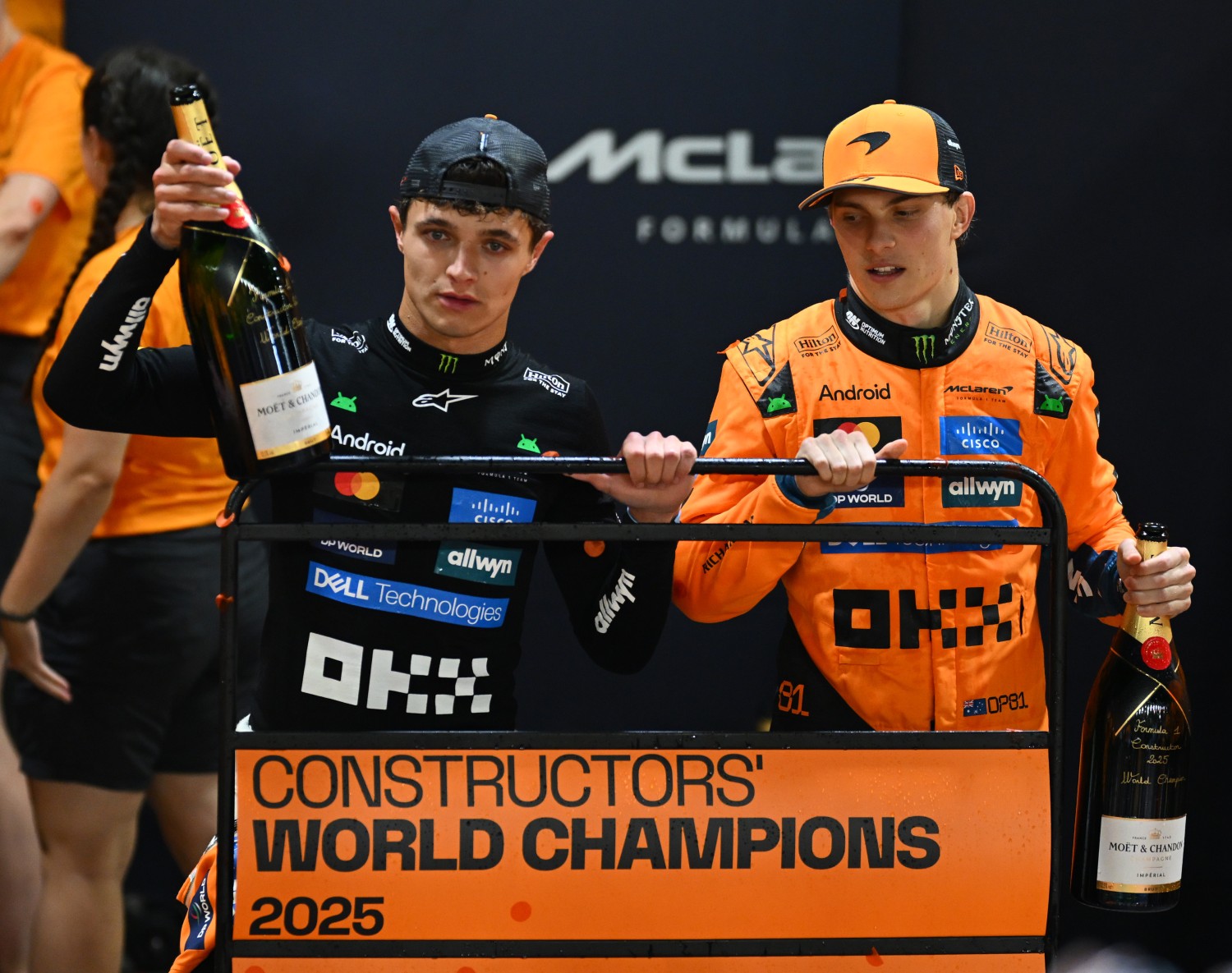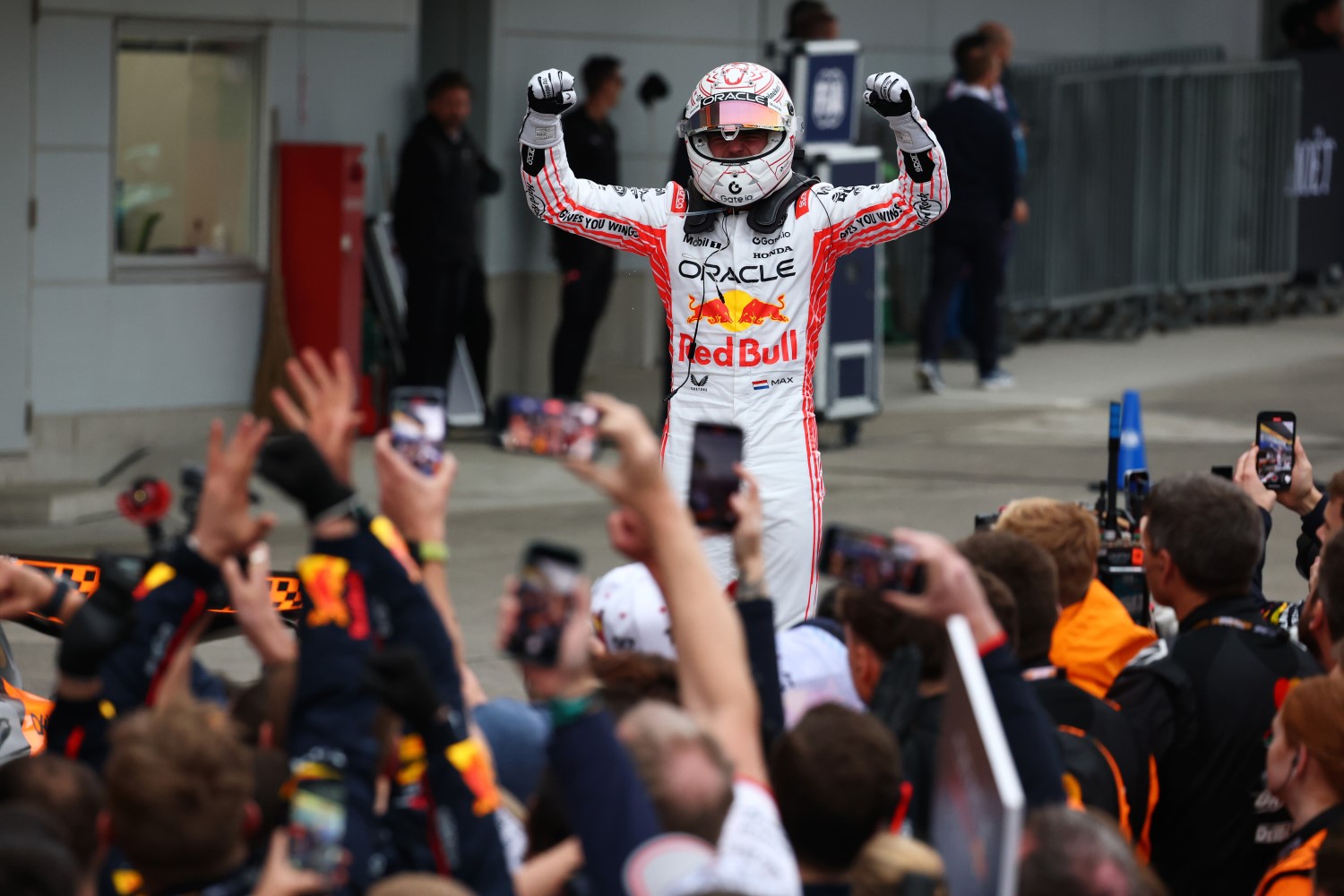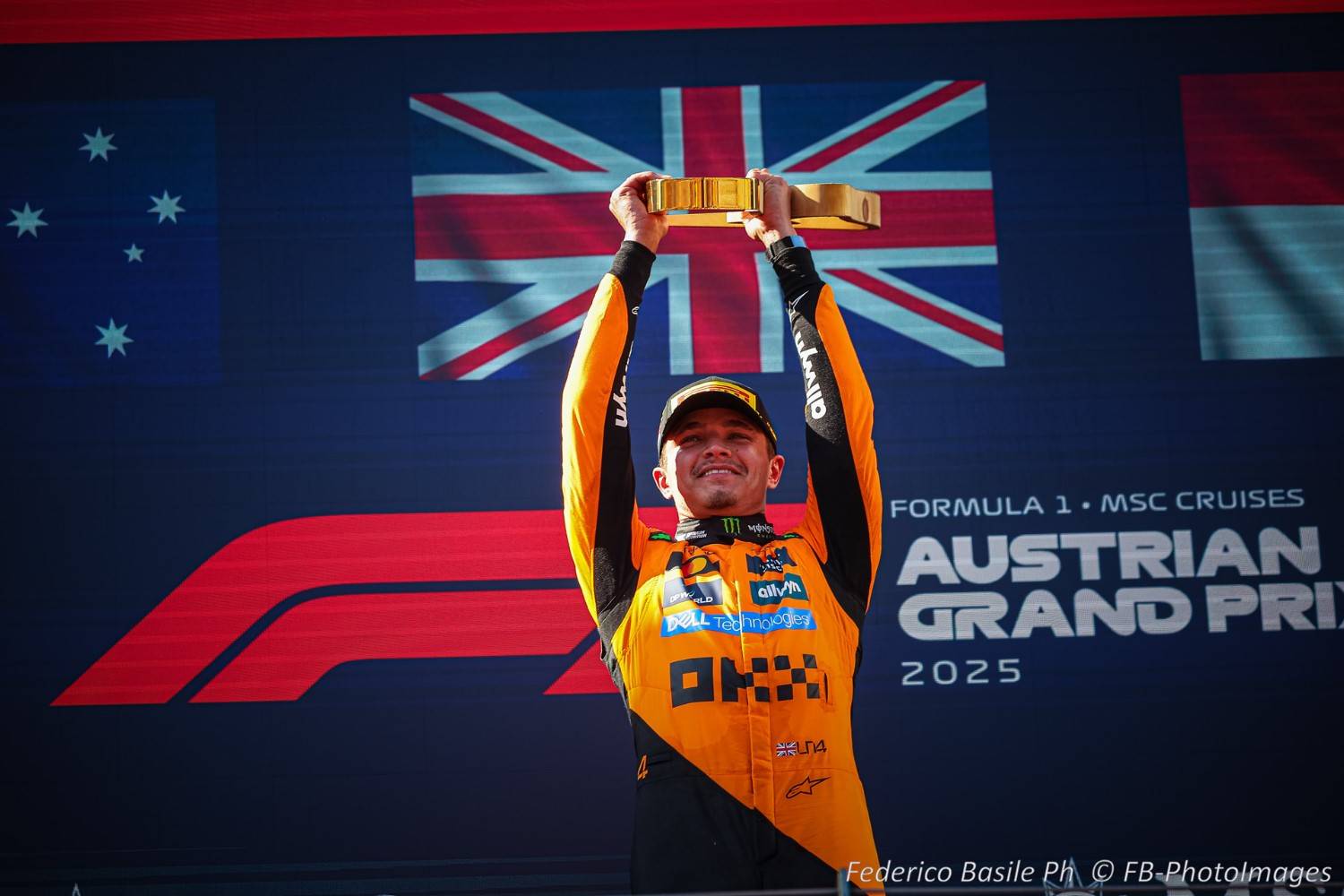McLaren Under Fire: Nationalism or Fair Play? The Debate Over Favoritism Toward Lando Norris in F1’s Tightest Title Fight
As the Formula 1 season barrels toward its climax with just six races left, McLaren’s papaya duo—British star Lando Norris (pictured) and Australian sensation Oscar Piastri—find themselves locked in a fierce intra-team battle for the drivers’ championship.
–by Mark Cipolloni–
Piastri holds a slender 22-point lead, but whispers of bias have grown into a roar, fueled by a scathing Daily Mail column accusing the Woking-based squad of systematically “shafting” the Aussie in favor of their homegrown hero. With McLaren already crowned constructors’ champions for the second straight year, the question looms: Is there real evidence of favoritism, or is it just the heat of competition amplifying old rivalries?
The controversy ignited most recently after the Singapore Grand Prix, where Norris’s aggressive first-lap lunge on Piastri resulted in contact, allowing the Brit to snatch third place while Piastri dropped to fourth. McLaren opted against a position swap, drawing ire from fans and pundits alike.

“Norris forced a pass at turn three, resulting in contact between the McLarens; the team allowed the result to stand,” the Daily Mail’s Peter van Onselen wrote, labeling it a symptom of a deeper “pecking order” that treats Norris as a “national treasure” and Piastri as expendable.
Van Onselen pointed to a pattern: split strategies in Hungary that handed Norris a “brave” one-stop win while Piastri toiled on a two-stopper; a Monza pit-stop blunder for Norris that prompted explicit team orders for Piastri to yield position (which he did, calling it “fair” but fueling bias perceptions); and even radio tones, where Norris gets “pastoral care” and Piastri lectures on patience.
These incidents aren’t isolated in the narrative. At the United States Grand Prix, British commentator Martin Brundle pinned blame on Piastri for an “ill-judged” clash with Norris, framing the Australian’s “risk management” as the culprit in a moment many saw as unavoidable.
And in a viral clip from Japan, Red Bull’s Max Verstappen—trailing the McLaren pair in the standings—laughed off a reporter’s query about the favoritism with a cheeky “Absolutely!” before adding it might indirectly help his own title bid.

Verstappen’s quip echoed sentiments from F1 legend Mario Andretti, who told media, “It seems like McLaren supports Lando more…I don’t know why,” praising Piastri’s “calmer and more calculated” style as overlooked.
Fan frustration boils over on social media, where a RacingNews365 poll revealed a staggering 90% of respondents believe McLaren favors Norris, with just 1% backing Piastri and 6% seeing equality. X (formerly Twitter) is ablaze with accusations: One user lamented, “If Max wins tomorrow, [Piastri] is in HUGE trouble and it’s all because McLaren and their stupid papaya rules favor Norris,” while another fumed, “McLaren about to hold a press conference forcing Piastri to say that McLaren is not favoring Norris.” The nationalism angle stings particularly for Piastri’s supporters, with van Onselen arguing Australians demand “parity, not special treatment,” yet feel the “coin toss always seems to land Lando’s way.”
Yet, for every accusation, McLaren and its drivers push back hard, insisting the “papaya rules”—designed for clean intra-team racing without hierarchy—hold firm. Piastri himself has repeatedly dismissed bias claims, telling reporters in Austin, “I’m very happy that there’s no favoritism or bias,” after an internal review held Norris accountable for the Singapore incident.
Norris admitted to facing “consequences” through season’s end, a rare admission that undercuts favoritism talk. Team principal Andrea Stella echoed this in August, vowing no favoritism “until it’s mathematically necessary,” a stance he reiterated amid the constructors’ triumph.
Sky Sports’ Ted Kravitz went further, debunking conspiracy theories as “complete nonsense” after dissecting the Hungary GP, where Norris’s one-stop was a calculated risk, not sabotage—Piastri’s undercut simply didn’t pay off as hoped. The Race’s analysis of the 2025 season similarly questions the “unfair treatment” narrative, noting McLaren’s equal resource allocation and Piastri’s own wins (he’s clinched more points overall for the team). Even former Haas boss Guenther Steiner, who once urged backing the points leader, has been quiet lately as Verstappen’s recent surge—wins in Texas and Japan—exposes vulnerabilities in McLaren’s no-favoritism policy.
| Key Incidents | Claimed Bias Toward Norris | Counterpoint |
| Hungary GP | One-stop strategy handed Norris the win; Piastri on two-stopper. | Risky call backfired on Piastri’s undercut; equal opportunity per team review. |
| Singapore GP | No position swap after contact; Norris kept P3. | Internal punishment for Norris; stewards cleared both; Piastri calls it fair. |
| Monza | Team orders forced Piastri to yield after pit error. | Piastri complied pre-racing; consistent with rules; he later praised equality. |
| US GP | Commentators blamed Piastri for “unavoidable” clash. | Brundle’s view subjective; McLaren focused on recovery, not fault. |
The evidence? It’s more smoke than fire. While interpretive slights—like strategy “nudges” or celebratory oversights (Piastri “nowhere to be seen” during constructors’ cheers)—feed the fire, hard proof of systemic favoritism is elusive. McLaren’s transparency in punishing Norris and Piastri’s on-record contentment suggest a team walking a tightrope: fostering rivalry to maximize constructors’ points without alienating talent. As one X user noted, “The extent to which the team has gone to give both drivers the opportunity… is insane,” dismissing bias as “utter nonsense” from uninformed influencers.
McLaren Has a History of Favoring Its British Drivers
The current Norris-Piastri friction isn’t McLaren’s first brush with accusations of national bias. Flash back to 2007, when a rookie Lewis Hamilton joined forces with two-time world champion Fernando Alonso—and the Spaniard quickly felt the sting of favoritism toward the British newcomer. Alonso, who arrived as the reigning champion, has long maintained that team principal Ron Dennis tilted the scales in Hamilton’s favor, creating an untenable garage divide that ultimately drove him out the door.
In a candid 2023 reflection, Alonso described the season as poorly managed by leadership: “I couldn’t continue with McLaren. It was a team with eyes totally on one side of the garage. As Ron said after the penultimate race in China: ‘Our race isn’t with [Ferrari driver Felipe] Massa, it is with Fernando.’ When your team says that, you cannot continue.” The duo tied on points with four wins apiece, but both lost the title to Kimi Raikkonen by a single point amid escalating tensions. Highlights included Alonso’s infamous Hungarian GP qualifying blockade to thwart Hamilton’s final lap, which earned him a grid penalty, and the overarching Spygate scandal that fined McLaren $100 million and stripped their constructors’ points.
Former Renault teammate and 1997 champion Jacques Villeneuve has vocally backed Alonso’s narrative, arguing on the Red Flags podcast that Dennis “unbalanced” the team by anointing Hamilton as the future star. “You also have to take into account that McLaren signed him [Alonso], or Ron Dennis signed him, as a double World Champion… Then he announced Hamilton [and said]: ‘OK, Hamilton is our champion. We don’t like you, Fernando.’ … Alonso was not in a fair field at that point and he had to fight his own battle alone in the team. That actually destroyed the team ultimately.” Alonso’s engineer at the time, Chris Hessey, later corroborated this, revealing Dennis’s “investment” in Hamilton fueled the preferential treatment.
Alonso’s abrupt exit to Renault at season’s end underscored the rift, with his manager Flavio Briatore having warned him pre-signing about Hamilton being “in the pockets of Ron Dennis.” While some, like forum debates from the era, dismissed outright favoritism—pointing to Hamilton’s equal treatment as a rookie prodigy—Alonso’s repeated assertions paint a picture of systemic British leanings that echo today’s debates. As one retrospective quipped, 2007 marked “the peak of British favoritism,” where a two-time champ was pitted against a homegrown talent on what felt like unequal footing.
With Verstappen lurking 40 points behind Piastri, the pressure mounts. A “ruthless” pivot to back the leader—as some tip—could silence critics, but at what cost to team harmony? For now, the papaya rules reign, but in F1’s cutthroat world, perception can be as damaging as reality. As Piastri hunts a maiden title Down Under, one thing’s clear: This teammate tango is testing McLaren like never before.
